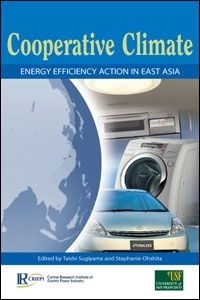Cooperative Climate: About the Authors
Contents
Gørild Heggelund
Gørild Heggelund is Director of the Global Program and Senior Research Fellow at the Fridtjof Nansen Institute, Norway. Her main research areas are China’s energy and climate, and environmental policy in general. Heggelund participated recently in the OECD Environmental Performance Review (EPR) of China (to be published in 2007). She is currently carrying out research on China’s climate change policy-making including the developments of the Clean Development Mechanism (CDM) under the Kyoto Protocol in China. Heggelund has specialized in the Three Gorges Dam project on the Yangtze River in China, and completed her Ph.D. dissertation with a focus on the environment and resettlement politics for the dam in 2002. Heggelund, fluent in Chinese, has lived in China for a number of years, studied at Beijing University and worked in the United Nations Development Program (UNDP) Beijing office with responsibility for energy and environmental projects.
Alan Meier
Alan Meier is Senior Scientist at the Lawrence Berkeley National Laboratory, United States. Dr. Meier earned degrees in chemistry, economics and a Ph.D. in energy and resources. Most of his research has dealt with understanding how energy is used and how it could be used more efficiently. His work relies heavily on field measurements of the energy use of buildings and equipment. About a decade ago, he began to study the energy consumption of “miscellaneous” equipment and, more recently, the energy use of appliances when they were switched off. This research sparked his interest in standby power and launched an unusually successful global effort to reduce standby power in all sorts of equipment. Dr. Meier has published over 100 papers and articles in journals, magazines and conference proceedings, mostly about energy efficiency. He founded the magazine, Home Energy, and served as Editor-in-Chief of the journal, Energy and Buildings. This book includes research undertaken while Dr. Meier was a Senior Energy Analyst at the International Energy Agency in Paris.
Stephanie Ohshita
Stephanie Ohshita is Assistant Professor of Environmental Science and Management at the University of San Francisco (USF). Her research centers on energy-based solutions to multiple environmental problems—from local air pollution to global climate change—and combines engineering with tools from political economy and organizational theory. She has specialized in energy and environmental issues in Japan and China, examining cleaner energy technology cooperation between the two countries, as well as policy design and implementation. Prior to joining USF, Dr. Ohshita worked as a consultant to government and industry in the U.S. and Japan in the areas of air pollution, climate change, environmental risk assessment and environmental policy. She holds an SB in chemical engineering from MIT, a research certificate from Tokyo Institute of Technology, and an MS and Ph.D. in environmental engineering and policy from Stanford University.
Jonathan Sinton
Jonathan Sinton is China Program Manager at the International Energy Agency’s Office of Non-Member Countries. Before joining the IEA, he was a long-time member of the China Energy Group at the Lawrence Berkeley National Laboratory, where he engaged in wide-ranging research on energy supply and demand policy—much of it in collaboration with colleagues in China—as well as compilation, evaluation, and analysis of energy and economic data. In addition to macro-level topics, he has also investigated energy use and associated environmental and health impacts at the firm and household levels. Dr. Sinton, a native of New York, earned a Bachelor’s degree at Harvard College and a Doctorate at the University of California, Berkeley.
Taishi Sugiyama
Taishi Sugiyama is the Leader of the Climate Policy Project at the Central Research Institute of Electric Power Industry (CRIEPI), Japan. He serves as a lead author of the IPCC Fourth Assessment Report. He serves as a member of the Future Framework Committee that made recommendations on a post-2012 framework to the Japanese government, as well as a member of the Market Mechanisms Committee of the Japanese government. He also served on the Small Scale Clean Development Mechanism (CDM) Panel of the CDM Executive Board and the Scientific Steering Committee of the International Human Dimension Program (IHDP)/Institutional Dimensions of Global Environmental Change (IDGEC).
Stephen Wiel
Stephen Wiel is currently the President of the Board of the Collaborative Labeling and Standards Program (CLASP). He previously served as Head of the Energy Analysis Department at Lawrence Berkeley National Laboratory (LBNL), where he also established LBNL’s Washington Office; led the greenhouse gas mitigation component of the U.S. Country Studies Program; served as senior advisor to the U.S. Department of Energy on integrated resource planning and demand-side management in the utility sector; and created the initiative on international energy efficiency standards and labels that evolved into CLASP. He currently serves on the Board of Directors of the American Council for an Energy Efficient Economy and two local organizations supporting homeless women. Steve has Bachelor’s and Master’s degrees in chemical engineering from Stanford University, and a Doctorate from the University of Pittsburgh, Graduate School of Public and International Affairs. He has published 151 books, articles, reports and papers on the subject of energy efficiency and the environment. He has served as a member of teams advising officials in Pakistan, the Philippines, Indonesia, Japan, China, Australia, Poland, Czechoslovakia, Romania, the Russian Federation and Mexico, and has otherwise traveled extensively in his work.
|
|
